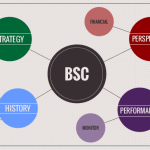A Librarian’s Success Tool – The Balanced Scorecard
How do you measure your library’s success? Is it circulation numbers? Or the number of searches on your electronic databases? In a recent customer survey, EBSCO Publishing found that over 60% of its customers had no formal way of tracking organizational success and that over 50% of public and academic libraries used informal customer feedback as their primary metric of success.
Without clearly defined metrics there is no way to determine relative effectiveness in achieving the library’s mission. This inability can have tremendous impact on many key operations. Implementing clearly defined metrics allows a library to directly address its critical challenges, motivate its employees and increase its value and transparency to its constituency.
A performance measurement system that would reinforce a library’s strategy and complement its resources is the Balanced Scorecard (BSC). The University of Virginia Library is well known for its successful implementation of the BSC.
The BSC is easily applicable to libraries as it:
- Clearly links the strategy to the core activities of a library in a structured framework. Rather than focusing on just budget size or informal customer service feedback, the BSC allows library managers to focus on several different indicators in an organized manner;
- Has a proven record of being effective and adaptable to all types of organizations, therefore it is suitable for libraries too;
- Is easily communicable to staff, partners and the public;
- Is consensus driven, relying on the input of stakeholders, both internal and external to the organization.
As we already know, not all organizations are capable of developing and implementing a BSC. Certain things are critical to success. Because of the lack of these key elements, it is significantly more difficult to succeed.
There are also circumstances specific to library environments that make the implementation of performance metrics particularly difficult:
- Gathering and collecting data can be difficult. Only a select set of library tools, such as EBSCOhost Online Databases, offer robust reporting and statistical tools to measure usage and effectiveness;
- The ability to reward performance is limited as Head Librarians may not have discretion over remuneration and little discretion for rapid promotion;
- A lack of capable resources and an inability to allocate a project lead to spearhead a formal measurement process is difficult in libraries that are understaffed;
- There is a prevalent culture that does not include a strong emphasis on measuring performance primarily due to lack of resources or an inability to systematically collect and synthesize the data.
Once these gaps are filled out, the BSC process will allow the monitoring of operating activities in a way to ensure that library staff and management are performing daily activities that contribute to the achievement of long-term initiatives.
Image Source:

Tags: Balanced Scorecard, libraries, Performance in USA, Performance Management, University of Virginia, University of Virginia Library






